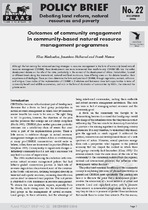Outcomes of community engagement in community-based natural resource management programmes
Abstract
Although the last century has witnessed exciting strategies in resource management in the form of community-based natural
resource management (CBNRM), these developments are more incremental than revolutionary. CBNRM falls into the wider
development debate on the role of the state, particularly in the context of the development of Africa. Stakeholders, located
at different levels along the international, national and local continuum, have differing views on this debate based on their
experience and ideologies. These positions determine the form and practice of CBNRM, through negotiation, contests, collusions
and intrigue. Case studies of the implementation of CBNRM in Zimbabwe and Botswana show both opportunities in terms of
community benefit and wildlife conservation, and risks in the form of domination of communities by NGOs, the state and the
private sector.

